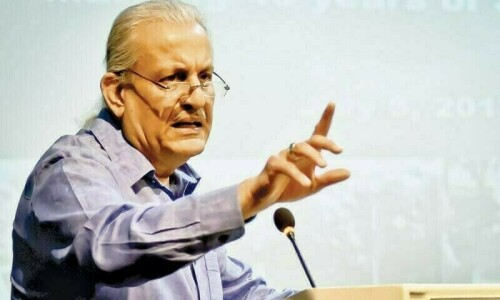KARACHI, Feb 9: The mammography is the single most important factor in the early detection of breast cancer and is, therefore, the most important breast imaging technique.
This was said by Consultant Radiologist of Liaquat National Hospital Dr Zubaida Qureshi at a seminar on "Screening and early diagnosis of cancer" organized in the hospital premises on Tuesday.
In her presentation on "Radiological aspects of breast cancer screening", she said that breast cancer was the commonest cancer among women in both high and low income countries.
"Breast screening and improvements in treatment have reduced mortality from breast cancer in high income countries, but the survival rate in middle and low income countries remains poor mainly because of late presentation of the cases," she said.
She pointed out that the main concept in cancer screening was that detection of early disease would make it possible to reduce mortality rate, as obviously treatment at early stages was more effective than treating it late.
"The aim of screening for cancer is to detect lesions and if left untreated it could progress to clinical cancer," she said, adding that breast cancer contributes 22 per cent of all new cancer cases annually with ratio of one in every seven women. She maintained that the survival rate went up to 97 per cent with early detection of lesions.
Referring to various studies, she said that screening mammography was associated with approximately 20 to 30 per cent reduction in breast cancer mortality among 40-year-old women.
"Women should start self-examination of their breast at the age of 20 and get examined from physician after every three years till the age of 40. Initial screening should be made at 30 years of age," she added.
About other imaging techniques, she said that ultrasound was less specific than mammogram, but a combination of mammography and ultrasound could increase sensitivity in dense breasts. "Ultrasound guided-needle localization can be performed prior to excision of an impalpable lesion," she added.
Consultant in charge of oncology department Dr Naila Zahid in her presentation on "Screening and early diagnosis of cancers: Does it make a difference?" said that prostate and lung cancer were the most common cancer in men and breast in women.
"Breast, head and neck, lymphoma, colorectal, lung and hepatoma cancers are common malignancies in Pakistan. According to NCI estimates, up to 50 per cent of cancer mortality can be reduced by health educational measures to target high-risk behaviours for the most common cancers, promoting screening and early detection of breast and cervical cancers and facilitating access to adequate treatment," she said.
Talking about risk factors, she noted that up to 30 per cent of cancers were probably related to diet and nutrition and both were preventable causes. "Obesity is linked to high risk of cancer of endometrium (39 per cent), kidney (25 per cent), breast-post menopausal (10 per cent), colon (11 per cent) and oesophagus (37 per cent)," she added.
Dr Naila said that smoking and alcohol had a synergistic effect and approximately relative risks for developing mouth and throat cancers were seven times greater for tobacco users, six times greater for alcohol drinkers and 38 times greater for users of both tobacco and alcohol.
"Lack of physical activity is also a risk factor for cancer of colon, breast and prostate (possibly). Increasing level of activity reduces 40 per cent risk of colon cancer and 20 to 40 per cent of breast cancer," she added.
She stressed on primary cancer prevention through controlling risk factors by modification or elimination. "There are several barriers to screening including social and cultural norms, psychological factors (fear and anxiety), access to the health care system and insurance status, behavioural factors, perceptions of personal risk for disease. On part of physician, there is lack of time and competing priorities, no reimbursement for counselling on preventive behaviours mobile population, lack of professional consensus on benefits of some screening tests," she said.
According to her, cancer screening tests require optimal performance characteristics for effective use in screening programmes within populations. Understanding the scientific evidence for screening recommendations promotes best clinical care of patients. And preventive medicine requires active participation of clinician and patients in a partnership for health.
The head of gastroenterology department, Dr Jamila H. Ismail, spoke on "Screening of colorectal cancer". She said that most patients of colon cancer sought medical help late in the course of their disease.
"Patients with bleeding PR, recent change in bowel habit and anaemia require colonoscopic evaluation. Patients over 50 years should get yearly test of stool occult blood. Family members of patients of colon cancer and adenomatous polyas presenting less than 60 years should be screened for colon cancer," she added.
Dr Jamila reiterated screening of high risk groups decreased the morbidity and mortality from colon cancer.
Among others, Consultant Oncologist S. Najeeb Niamatullah and Dr Roofina of Liaquat National Hospital also gave presentations. - PPI














































Dear visitor, the comments section is undergoing an overhaul and will return soon.